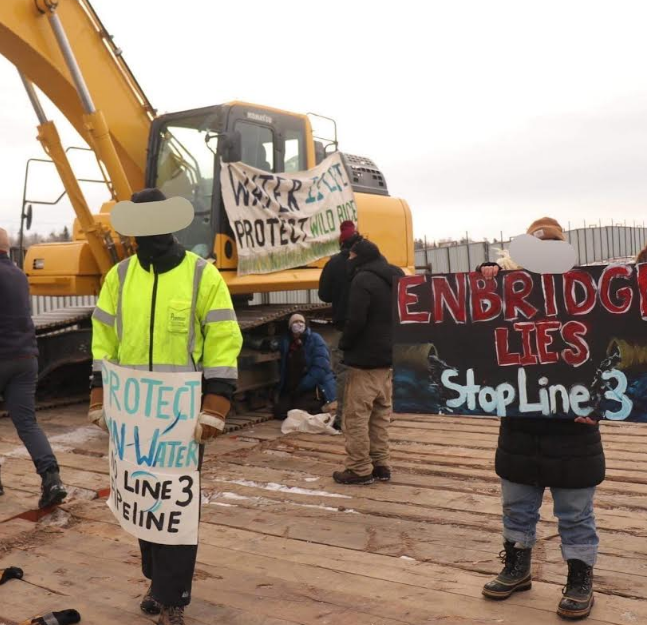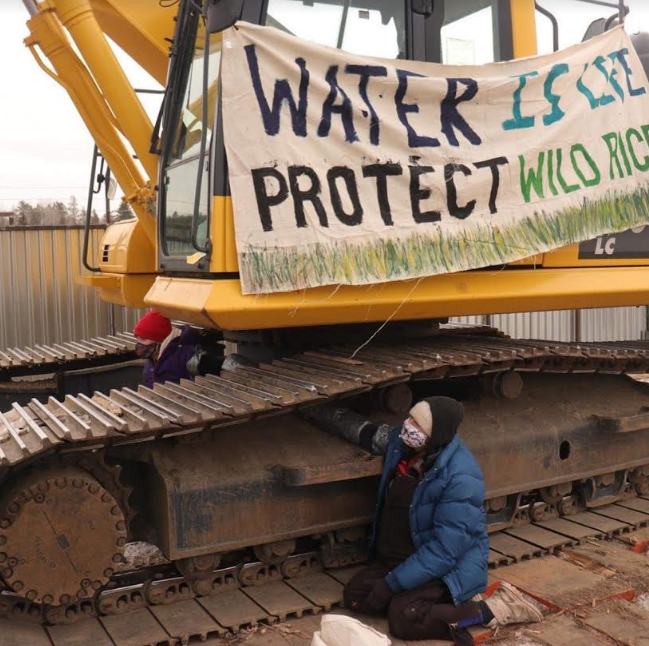
- Details
- By Darren Thompson
TWO INLETS, Minn. — Early this morning, two people locked themselves to equipment used for Enbridge’s Line 3 tar sands oil pipeline in northern Minnesota. The action was organized by the Giniw Collective and comes days after various permits were granted in the state of Minnesota, pushing the highly controversial pipeline closer to construction.
“Gov. Walz said we need to act boldly on climate,” Tara Houska (Ojibwe), founder of the Giniw Collective, told Native News Online. “Then he approved the largest tar sands infrastructure project in North America through Anishinaabe territory.”
“Having grown up on occupied Anishinaabe and Dakota land, I feel a responsibility to defend that land and the rights of the people who have a relationship to it,” Mira Grinsfelder, 24 of Saint Paul, Minn., said in a statement prior to locking herself up to Enbridge equipment.
“If the US government won’t defend Anishinaabe treaty rights, we will. If the Minnesota government won’t protect the water, we will,” added Grinsfelder.
 Activist locked to a bulldozer to stop construction.
Activist locked to a bulldozer to stop construction.
Native News Online reported on Thursday, Nov. 12, the Minnesota Department of Natural Resources and the Minnesota Pollution Control Agency (MPCA) approved various permits for Enbridge’s Line 3. The result brought hundreds of people in protest at the Governor’s Mansion on Saturday, clashing with a pro-Trump rally with people voicing they support pipelines.
Yesterday, Minnesota Public Radio (MPR) News reported that 12 out of 17 MPCA advisory group members resigned in protest over the approval of MPCA Commissioner Laura Bishop approval for a key water permit that pushes Line 3 closer to construction. White Earth tribal member and former Green Party Vice-Presidential candidate Winona LaDuke is one of the twelve that resigned.
“We cannot continue to legitimize and provide cover for the MPCA's war on black and brown people," their resignation letter stated.
Enbridge’s Line 3 is the largest project in the company’s history and would be one of the largest crude oil pipelines in the continent, according to a statement on the company’s website. Line 3 is expected to transport up to 760,000 barrels a day through northern Minnesota, passing through treaty lands of several Ojibwe bands.
To date, five Ojibwe bands have resisted the pipeline replacement project in court: White Earth, Red Lake, Mille Lacs, Fond du Lac, and Leech Lake. Canada, North Dakota, and Wisconsin have all approved their segments of the pipeline.
“If his [Gov. Walz’s] administration won’t stand up to big oil, we will,” added Houska.
More Stories Like This
Navajo Nation Urges Biden to Halt Uranium Transportation Through Its LandsNavajo Nation Agreement to Settle All Water Rights Claims in Arizona
Biden Expands Two National Monuments in California by 120,000 Acres
Sault Tribe Joins the Fight for Mother Nature’s Legal Rights with New Resolution
Former NCAI President Fawn Sharp Appointed to Nature Conservancy Board
These stories must be heard.
This May, we are highlighting our coverage of Indian boarding schools and their generational impact on Native families and Native communities. Giving survivors of boarding schools and their descendants the opportunity to share their stories is an important step toward healing — not just because they are speaking, but because they are being heard. Their stories must be heard. Help our efforts to make sure Native stories and Native voices are heard in 2024. Please consider a recurring donation to help fund our ongoing coverage of Indian boarding schools. Donate to Native News Online today and support independent Indigenous-centered journalism. Thank you.
